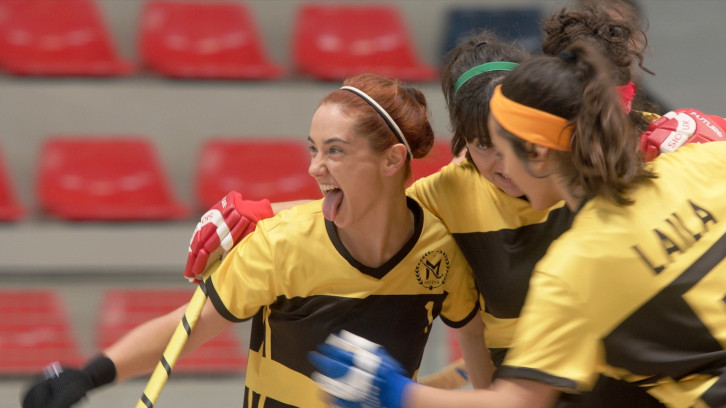"The Hockey Girls": a feminine victory in sports TV fiction

UAB researchers have analysed "The Hockey Girls", a fictional series about female sport, and concluded that the production challenges gender stereotypes, promotes sisterhood and intersectionality. The positive representation of female characters, the inclusion of sexual diversity and the construction of an affective community are key elements to promote a new framework of gender relations in sport.
As seen with the dismissal of Luis Rubiales from his presidency in the Royal Spanish Football Federation (RFEF), due to a non-consensual kiss to player Jennifer Hermoso, in recent years significant changes have been taking place in the sporting sphere. We can see the women's football fields full to overflowing, and women's football sections have begun to form part of the sports news. It is in this context that "The Hockey Girls" (“Les de l'hoquei”, TV3, 2019-2020; Netflix, 2019), a Catalan fictional TV show broadcast in prime time, aimed at families and young audiences and which originated in the university environment from the creators' undergraduate degree’s final project at the UPF.
Our research is focused on analysing which mechanisms of change this fiction promotes by narrating the adventures of the amateur women's hockey team Minerva Club, doomed to disappear, and the struggle to maintain its place in the league. The mechanisms used to promote the change stem from reversing the majority trend in sports practice and its representation in fiction, hegemonically male. Traditionally, the representation of women has been limited to objectification, stereotypes, invisibilization, and the practice of "supposedly feminine" and, therefore, minority sports. Whereas, the series focuses on an amateur women's field hockey group, without objectification or stereotypes. The visibility of women in “The Hockey Girls” is produced using intersectionality (a description of female characters considering their gender, social class, age, and ethnicity) and sorority (female solidarity linked to intersectionality and empowerment). Therefore, the production focuses on the lives of the female players and the two female coaches.
The results of the quantitative and qualitative research show that the series is based on the interrelationship between sorority and female empowerment. From the very beginning, the protagonists unite to confront the problems related to the practice of sport. Both coaches represent the current moment of change in feminism, emphasising the difference between the fourth wave of the feminist movement and previous ones. The fourth wave is characterised by the MeToo movement, activism and social networks and intersectionality, while the second wave is characterised by vindictive feminism. The coach Terrats (played by the actress Nora Navas) as a representative character of the second wave, is surpassed by the fourth generation feminism embodied by her young successor, Anna (Iría del Río), who contributes with her own way of leading, in a feminine way, respecting individual differences, which turns out to be successful. Triumph is understood as the result of a collective struggle, with mutual help, sisterhood and solidarity, overcoming obstacles with the help of a caring community. Winning "in a feminine way", with social and personal bonds, empathy and teamwork, and without forgetting to have fun.
This construction of a caring community includes men in order to create a collective subject, for without them this change and proposal of a new way of gender relations would not be possible. Our research shows that female characters are overrepresented, and mostly defined by positive attributes (autonomy, independence, entrepreneurship, initiative, feminism struggle, and solidarity). The representation of boys is less assertive, more emotional, sensitive, and tender than that of the female characters. Women are more determined, ambitious, free, and courageous. The help of the young people contrasts with the representation of some adult male characters, some of them embodying heteropatriarchy antithetical to the goals of the protagonists and the axiological values promoted by the series. Additionally, “The Hockey Girls”promotes sexual diversity by the acceptance and normalization of homosexual relationships. The intersectionality of the characters promotes a new collective subject, through the acceptance of differences and diversity, which does not prevent the joint struggle for equality, but encourages it.
Anna Tous Rovirosa
Elena Fedotova
Gendered Sports Fiction Research Group
Sports Research Institute (IRE)
Department of Journalism and Communication Sciences
Universitat Autònoma de Barcelona
References
Tous-Rovirosa, A.; Prat. M.; Dergacheva, D. (2022) The Hockey Girls. The creation of a new collective subject: sisterhood and the empowerment of women, Feminist Media Studies, DOI: 10.1080/14680777.2022.2029526


